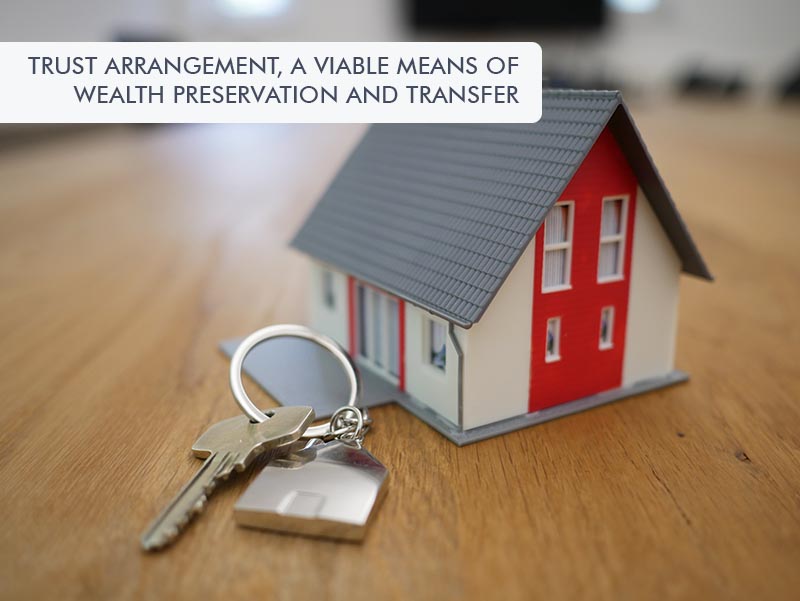What is a Will? Have you written your Will? When will you write your Will?
If your heart skipped a beat reading these questions, you are not alone. The subject of Will writing is wrongfully considered a death wish, causing many to postpone this responsibility until it is too late. One such case was the judicial matter of Duru v. Duru, where the only surviving child of the deceased was forcefully plunged into a legal battle for inherited property, as there was no Will to corroborate his claims.
Would you want your loved ones to suffer when you are no more?
If your answer is no, but thinking of your passing still rubs you the wrong way, creating a Trust just might be the perfect option for you.
WHAT IS THIS TRUST OF WHICH WE SPEAK?
A Trust is a 3-party arrangement whereby a party (the Settlor) transfers property to a second party (the Trustee) to hold for the good or benefit of a third party (the Beneficiary).
The concept of Trust arrangement began in the Medieval Period when a landowner left England to fight in a war. He handed over his land to another to manage in his absence, collect rents and keep the money for him pending his return, or to hand over the rents and feudal dues to his wife and children if he died in the war. Today, this same concept forms the basis of a Trust arrangement in Nigeria.
HOW EXACTLY DO TRUSTS WORK?
Creating a Trust is like hiring a driver to drive your car. It does not prevent you from driving the car yourself, nor does it preclude you from being driven in the car. It simply ensures that for ease of convenience or in the event of any form of incapacity, you have someone to drive you around. It also ensures that where you are unavailable, your family is not stranded since your driver can get your loved ones around if they need to go anywhere. Accordingly, it saves you the stress of managing the car by yourself. Your driver takes up the function of managing the vehicle based on your instructions. Hiring a driver also allows you to take advantage of their expertise in navigating Nigeria’s complex road systems. A Trust arrangement works in the same way.
Creating a Trust ensures that in the event of death or incapacity of any sort, the Trustee appointed can act on your instructions contained in a Trust Deed for the benefit of yourself and your beneficiaries. A Trust is, therefore, an alternative vehicle for securing your wealth for the benefit of your loved ones.
DIFFERENCES BETWEEN A TRUST AND A WILL
A Trust, like a Will, is a vehicle for wealth preservation and transfer. However, we have highlighted some noteworthy differences between them as follows.
- ProbateAssets in a Will are generally subject to Probate charges, a form of inheritance tax payable to the government before a beneficiary can access their inheritance under the Will. The Probate charge is usually 10%, depending on the State in Nigeria (or on the inheritance tax payable in the country where the inheritance is located, if not in Nigeria). Assets in a Trust, on the other hand, do not attract any probate charge.
- ConfidentialityA Will is a public document and is therefore accessible to the public once read. A Trust Deed, however, is confidential. In Nigeria, the confidential nature of a Trust has had the effect of limiting property disputes over the assets in a Trust Deed.
- Effective DateA Will is testamentary, and it comes into effect upon the death of the Maker. There are some associated implications to this. First, it means the maker of a Will cannot be a beneficiary of the Will since they must pass on before the Will can come into effect. In addition, it means that in extraordinary situations (such as where the maker of a Will becomes mentally incompetent, comatose or incapacitated in any form such as to deprive them of being able to manage their affairs), the Will still cannot be activated because they are still alive.
A Living Trust, on the other hand, comes into effect upon execution of the Trust Deed. This means that unlike a Will, the Settlor (maker) of a Trust can make himself or herself a beneficiary to a Trust. Accordingly, the Settlor in a Trust need not pass on before a Trust can be activated. This means that the Settlor can instruct the Trustee to act for their (the Settlor’s) benefit directly and not only that of loved ones.
Furthermore, in cases of incapacity of any sort, the Trustee in pursuance of the Trust Deed can step up to manage the assets of the Settlor for them and their loved ones.
- Asset ManagementA Will is used to distribute assets as soon as possible, following the passing of the maker. A Trust, however, allows for the management of assets even a long time after a person has passed on. For example, if a person has real property which they do not want to hand over right away upon their death, they may include an instruction in their Will or Trust Deed that if they pass on, the Trustee should continue to collect rent from the said property and give the rent to certain beneficiaries for a designated number of years. A person may also use a Trust to continue to manage their business following certain express instructions long after they have passed. They may choose to create a Trust to manage their company, funds or assets while they are alive, especially where the object of management requires special expertise that they do not possess.
- Capital FundA Living Trust is initiated with Assets transferred to the Trust or a Capital Fund, which would be invested. The amount of the initial capital fund is the prerogative of the Settlor in consultation with the Trustee. This initial capital fund or assets must be transferred into the Trust as a condition precedent for the Trust to be operational. A Will, on the other hand, does not require an initial capital fund or assets being transferred into it to become operational.
If you possess a legitimate fear of Will writing or you have now come to the understanding that a Will might be inadequate in securing the complexities of your assets or family, a Trust arrangement offers a viable alternative to wealth preservation and transfer.
To further explore the benefits of a trust, visit UTL Trust Management Services Limited and get yourself sorted!

NB: For additional details on creating a Trust, visit UTL Trust Management Services Limited at Private Trust Administration.


If a wife/widow is excluded from benefiting under a trust,what are her options can she context the trust
If an individual has excluded a wife/widow from the Trust, he would have had his reasons for doing so.
The nature of a Trust is such that it is confidential in nature and the arrangement is tailor made to suit the specific needs of the maker. However, as a general principle, almost everything can be contested and so she may be able to contest. If the individual has the desire to contest, we can assist in that regard. She can reach out to us through any of our contact channels for an engagement.